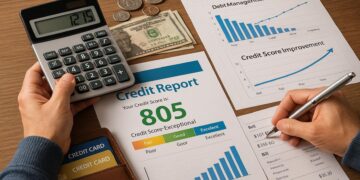
Strategies for Managing Debt and Improving Credit Score in Times of Crisis
In times of crisis, individuals face significant financial challenges affecting debt and credit scores. Effective strategies include creating realistic budgets, prioritizing high-interest debts, and negotiating with creditors. Enhancing credit scores involves timely payments, monitoring credit reports, and maintaining low credit utilization, fostering financial resilience and stability.

Comparison between Traditional Credit and Peer-to-Peer Credit: Advantages and Disadvantages
This article explores the comparison between traditional credit and peer-to-peer credit, highlighting their respective advantages and disadvantages. Traditional credit offers stability and regulatory protection, while peer-to-peer lending provides flexibility and accessibility. Understanding these nuances helps consumers make informed financial decisions in today's evolving credit landscape.

Technological Innovations and the Future of Banking Services in the United States
The article explores how technological innovations are revolutionizing banking services in the United States, highlighting mobile apps, artificial intelligence, and blockchain technology. These advancements enhance customer experience, streamline operations, and promote security, while also posing regulatory challenges that require traditional banks to adapt and innovate in a competitive financial landscape.

The Impact of Interest Rates on Personal Loans in the USA
Interest rates significantly impact personal loans in the USA, affecting borrowing costs and consumer behavior. As rates fluctuate due to economic conditions and Federal Reserve policies, potential borrowers must navigate loan types and credit scores to make informed financial decisions, ensuring they manage repayments effectively amidst changing economic landscapes.

The Role of Community Banks in Financial Inclusion in the USA
Community banks are crucial for financial inclusion in the USA, providing personalized services, accessible financial products, and innovative solutions for underserved populations. Their local investment strategies and advocacy efforts strengthen community economies, support job creation, and promote equitable access to vital financial resources for all Americans.

Debt and Mental Health: How Financial Stress Affects Well-Being and How to Overcome It
Financial stress significantly impacts mental health, leading to anxiety, depression, and relationship strain. Overcoming these challenges involves enhancing financial literacy, seeking professional help, and practicing mindfulness. Addressing the connection between debt and emotional well-being is crucial for reclaiming control and fostering a healthier, more secure future.

The Role of Financial Education in Preventing Debt and Credit Recovery
Financial education is crucial for preventing debt and facilitating credit recovery. By equipping individuals with budgeting skills, understanding borrowing dynamics, and recognizing the importance of credit management, financial literacy empowers consumers to make informed decisions, reduce debt accumulation, and build a stable financial future.

The Impact of Credit on Financial Life: How to Manage Debt and Improve Your Score
Understanding the impact of credit on your financial life is vital for effective debt management and improving your credit score. With strategic approaches like timely bill payments, monitoring credit reports, and building an emergency fund, individuals can enhance their financial wellbeing and unlock better borrowing opportunities.

The Importance of Financial Education in Preventing Indebtedness
Financial education is crucial in preventing indebtedness by equipping individuals with the knowledge to make informed financial decisions, recognize high-interest debt traps, and establish effective budgeting and savings strategies. Empowered consumers can navigate complex financial landscapes, fostering resilience and stability against increasing personal debt challenges.

How to Save on Everyday Shopping: Practical Strategies for Saving
Everyday shopping doesn't have to drain your wallet. By utilizing meal planning, coupons, and bulk buying, you can strategically lower expenses while maintaining quality. Embracing technology like cashback apps and understanding store policies further enhances savings. These practical strategies empower shoppers to make informed choices for a healthier financial lifestyle.